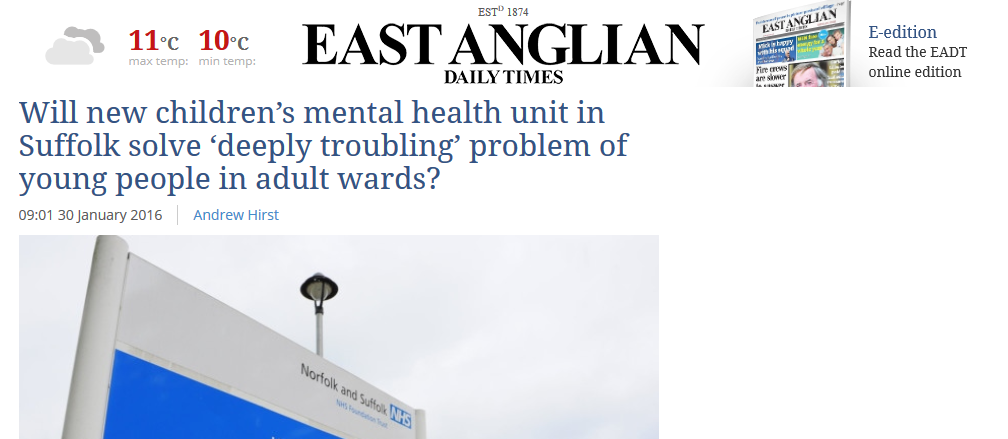In another example of first-class investigative journalism, Andrew Hirst of the East Anglian Daily Times reports:
Campaigners have welcomed plans for a new mental health unit for children in Suffolk after it emerged concerning numbers of young people from the region had been sent to adult wards – a practice described by one mother as “extremely cruel”.
The Norfolk and Suffolk NHS Foundation Trust (NSFT) announced this week it had invested nearly £1 million so work could begin on the “state-of-the-art” unit at Carlton Court, Lowestoft.
It comes as figures released following a Freedom of Information request confirmed 13 of the 41 young people admitted as inpatients by the NSFT in 2014/15 were sent to adult wards – the highest figure in the trust’s four year history.
Anne Humphrys, from Debenham, whose teenage daughter has complex mental health needs, said it was “extremely cruel” for children to be placed in adult wards and called for “urgent action to reverse this practice”.
“Any admittance to an inpatient unit is frightening to the young person and their family however if you know your child is being admitted to an adult ward you would be terrified,” she added.
The Norfolk and Suffolk Mental Health Crisis campaign group said it welcomed the plans. But it described the number of young people previously treated on adult wards as “deeply troubling”.
“Adult psychiatric wards are not a suitable or safe place for children and young people,” a spokesman added.
Last week it emerged 279 patients from Norfolk and Waveney, including young people, were sent out of the region for treatment. The figures, which were the highest in four years, costing the NSFT £4.3m, were severely criticised.
Of course, we are delighted by the decision to open additional CAMHS beds for young people. However, it is our understanding that NHS England has only agreed to fund about one half of the beds that NSFT is building. What happens if NHS England doesn’t provide the money?
NSFT has decided to close the learning disability beds at Lothingland with next to no public consultation; commissioners own documents admit this may see some children sent many miles away from home for extended periods. The CAMHS service at Lothingland is moving into the empty wards which provided much in-demand adult acute psychiatric beds at Waveney Acute Services. Expect Lothingland Hospital to be closed and sold to property developers along with the top of the Hellesdon Hospital site. The St Clement’s site has just been sold, though at a loss to book value of £900,000 after the mismanagement of the sale process.
Is the continual sale of property assets bequeathed by earlier generations a sustainable way to keep mental health services afloat today?
Currently, NSFT is raising between five and ten million pounds per year in property sales. In the end and not too far away, all the property will be gone and NSFT will be left with a multi-million pound hole in its annual budget and a substantial annual bill for property leases.
Would commissioners expect non-NHS providers like Virgin Care or Partners in Care to sell off existing property assets to subsidise inadequate funding of health services services? As we have seen repeatedly, when private providers don’t make a profit, they don’t sell existing assets, they just walk away. Don’t expect Richard Branson to be reaching into his own pocket and selling Necker Island any time soon.
Click on the image below to read the story in full on the EADT website:


A forward thinking imaginative board could create therapeutic activities on Hellesdon site ( and maybe others). Growing and animal care sport could be available to service users. Other areas have kept these type of activities from the old institutions to people’s benefit. Grounding activities are good for mental health. Might even save some money on admissions.
But we’ll see more short I solutions to public detriment as board only short term on big money.
The Trust closed down the Day Hospital Unit and the patient-run Choices cafe at Hellesdon Hospital, and made the staff redundant. They also got rid of the half-way hostels at Hellesdon after making staff redundant and allowing standards in the Hostels to deteriorate to a disgraceful unsafe level. Sometimes the Hostels were used for short respite admissions which saved patients from being admitted to hospital for much longer periods. Neither the Day Hospital nor the hostels were ever sufficiently resourced by the Trust but there is no doubt that such facilities have a part to play in a comprehensive mental health service.
Insightful piece
great article